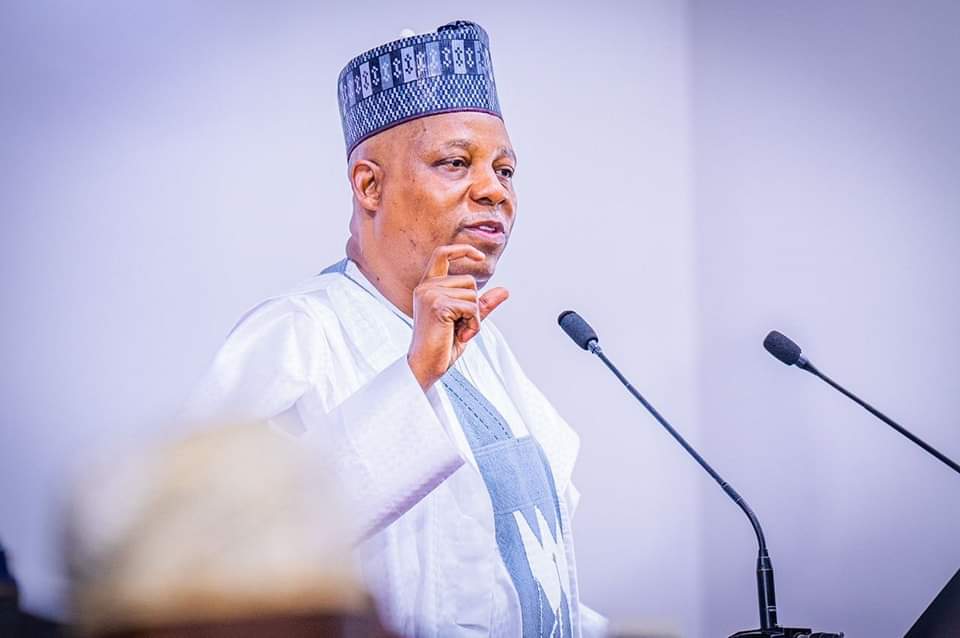Vice President Kashim Shettima has implored stakeholders and development partners to act cooperatively to combat the menace before it destabilizes the nation’s future.
He made the call Monday while inaugurating the Steering Committee of the Nigeria Jubilee Programme (NJFP), as part of measures by the federal government to scale up its employment initiative and enhance the employability of fresh graduates with market-ready skills and competence.
NJFP, a Nigerian government initiative being implemented by the United Nations Development Programme (UNDP) with a seed investment from the European Union (EU), is coordinated by the office of the Vice President.
- Hardship: No option to reforms if we must return Nigeria to path of growth – Shettima
- Kano emirship tussle: Court of Appeal fixes hearing for Oct 17
It was established to address challenges confronting Nigerian graduates in accessing meaningful jobs, as well as develop, test and deploy a scalable model that would effectively assist in tackling the root causes of growing unemployment and underemployment in Nigeria.
Senator Shettima, who acknowledged that youth unemployment had remained a serious challenge in Nigeria, described the programme as a decisive step by the administration of President Bola Ahmed Tinubu toward equipping Nigerian youth with the required tools to become employees, innovators and leaders in their chosen careers.
“Unemployment remains a critical challenge for Nigeria, and youth unemployment is an even more pressing concern. As a government, we fully recognise the far-reaching consequences that economic downturns have on young people.
“Prolonged periods of unemployment or underemployment can hinder future income potential and significantly diminish career opportunities. This is precisely why today’s gathering is so important.
“We cannot afford to delay; we must act collectively to tackle this issue before it severely undermines our future. It is therefore with a deep sense of responsibility and urgency that I convene this inauguration of the Steering Committee for the Nigeria Jubilee Fellows Programme (NJFP).”
VP Shettima, in a statement by his spokesman, Stanley Nkwocha, explained that his office directly coordinates the NJFP and some other crucial federal government initiatives, including Human Capital Development (HCD) programme, Investment in Digital and Creative Enterprises (iDICE) and the Expanded MSME Clinics programmes, because they are priorities for the Tinubu administration.
The NJFP, he said, is more vital because Nigeria’s future lies in the hands of the youth, adding that everything must be done within to secure their success.
Earlier in her remarks, the UNDP Resident Representative in Nigeria, Ms. Elsie Attafuah, commended the federal government for its “unwavering leadership and commitment to advancing Nigerian human capital development, particularly youth development as part of the Renewed Hope Agenda.”
While thanking the European Union for supporting the programme to the tune of 44 million Euros, Ms. Elsie said the NJFP seeks to champion home-grown talent, connecting young Nigerians with local opportunities through twelve months of placement where they apply their expertise to gain market-ready skills.
On his part, the European Union Head of Cooperation, Mr. Massino de Luca, said the Nigeria Jubilee Fellows Programme is a flagship that generates pride and excitement, not only here in their Abuja office but also in the EU Headquarters.
Shedding light on the impact of the programme on the Ministry of Youth Development, the Minister of Youth Development, Dr. Jamila Bio Ibrahim, said the NJFP is an initiative which aligns with the ministry’s initiative called the work-experience-programme where graduates are fixed into jobs and there is an opportunity to upscale and improve it with the NJFP programme.
She said her Ministry has the agenda to create 10 million jobs by 2027, adding that as a ministry they cannot achieve that alone.
Also speaking, the Minister of Industry, Trade and Investment, Dr. Doris Uzoka-Anite, said a total of 3,100 youths have been trained, far below the estimated target, attributing it to a number of reasons, including COVID-19 and the transition process of the immediate past administration.

 Join Daily Trust WhatsApp Community For Quick Access To News and Happenings Around You.
Join Daily Trust WhatsApp Community For Quick Access To News and Happenings Around You.

